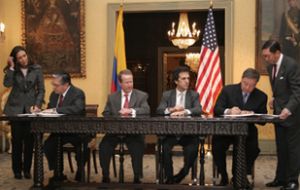MercoPress. South Atlantic News Agency
Colombia and US sign bases’ agreement in closed doors ceremony
 The pact maintains immunity from prosecution
The pact maintains immunity from prosecution Colombia and the United States signed Friday in Bogotá the controversial agreement that allows US military personnel to be stationed at seven (land, air, sea) military bases in Washington’s closest ally in the region.
The agreement was stamped by Colombian Foreign Affairs minister Jaime Bermudez and US ambassador in Bogotá, William Brownfield. Also present at the closed doors ceremony were Defense Minister Gabriel Silva and Interior and Justice Minister Fabio Valencia Cossio.
The US says it needs the bases to help in its fight against terrorists and narco-traffickers, especially since the closure a few months ago of a US base in Ecuador. The US maintains similar “forward operating locations” in El Salvador and Aruba-Curacao.
The Palanquero Colombian air force base in central Colombia will coordinate operations from all seven bases.
Colombia’s agreement which is an extension of a standing treaty dating back to 1974 and opens seven bases to US forces has come under harsh criticism in Latinamerica, particularly from President Hugo Chavez in neighboring Venezuela.
Chavez has likened the agreement to an “act of war” and accuses the US of wanting to stage military personnel nearby to destabilize his populist Bolivarian revolution government.
The US forward operating location in Aruba-Curacao is off the northern coast of Venezuela.
The US linked Colombia's agreement to a trade pact Bogotá has been strongly lobbying for during years but has been objected in Congress following allegations of human rights abuses and persecution of labor leaders.
Colombia also stands to gain from US help in the nation's 45-year-old war against drug funded Marxist oriented guerrillas known as the Revolutionary Armed Forces of Colombia, commonly called FARC.
The administration of President Alvaro Uribe has stated that the agreement does not need congressional approval. However Ambassador Brownfield pointed out that the US Congress Foreign Affairs committees in Representatives and Senate will have to consider the documents.




Top Comments
Disclaimer & comment rulesCommenting for this story is now closed.
If you have a Facebook account, become a fan and comment on our Facebook Page!